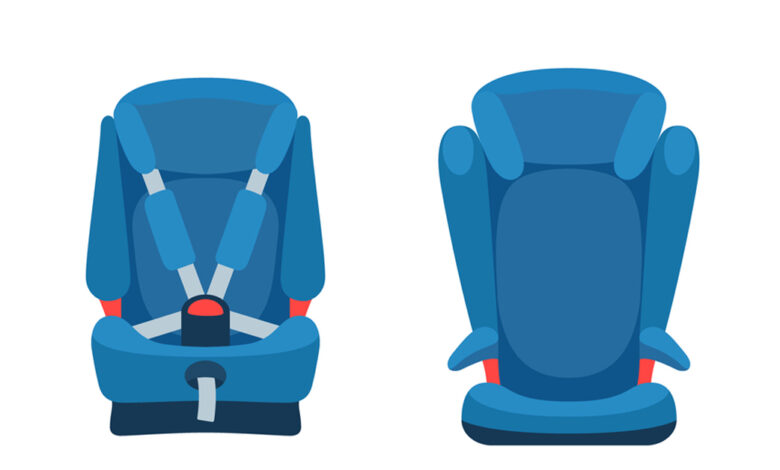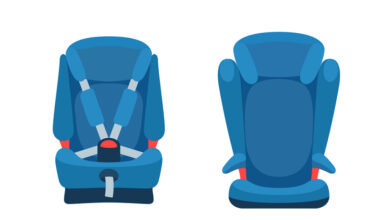The Baby Hates Car Seat Dilemma: Unveiling the Secrets to a Stress-Free Ride
Baby hates car seat

Introduction
Car seats play a crucial role in ensuring the safety of our precious little ones during car journeys. However, it’s not uncommon for babies to develop a dislike for their car seats. This article aims to explore the reasons behind this aversion and provide practical strategies to overcome it. By understanding the significance of car seats, the developmental factors contributing to discomfort, and potential psychological causes, parents can alleviate their baby’s dislike for car seats and create a stress-free ride.
Developmental Factors Capable of Causing Discomfort
Physical discomfort due to improper car seat installation
Improper installation of a car seat can lead to discomfort for the baby. A poorly fitted seat may cause awkward seating positions, inadequate support for their developing Baby car seat discomfort and uncomfortable pressure points. It’s essential to carefully follow the manufacturer’s instructions and seek professional assistance if needed to ensure the car seat is securely and correctly installed.
Sensory overload caused by car seat accessories
Babies are highly sensitive to their surroundings, and excessive sensory stimuli can create discomfort in their car seats. Accessories like headrests, strap covers, or toys attached to the seat might inadvertently overcrowd their environment, leading to sensory overload. Simplifying the car seat setup and removing unnecessary accessories can help create a more comfortable and soothing space for the baby.
Sensitivity to temperature fluctuations within the car
Temperature fluctuations within the car can be a source of discomfort for babies. They are more susceptible to extreme temperatures than adults, making them more sensitive to hot or cold environments. Ensuring appropriate temperature control by using car shades or adjustable climate settings can significantly enhance their comfort during the journey.

Addressing Potential Psychological Causes
Separation anxiety: The fear of being away from parents
Separation anxiety is a common developmental phase that babies go through. Being away from their parents, even for a short time, can trigger distress and provoke aversion towards the car seat. Parents can alleviate this anxiety by using techniques such as providing reassurance, soothing music, or small comfort objects that remind the baby of their presence.
Claustrophobia: The fear of confinement or tight spaces
Some babies may develop a fear of confinement or tight spaces, known as claustrophobia. The snug fit of a car seat might trigger this fear, causing distress and resistance. Gradually acclimating the baby to the car seat by using positive reinforcement, gentle persuasion, and distractions can help overcome this aversion.
Previous negative experiences in the car seat
A negative experience, such as a long and uncomfortable car journey or an incident where the baby became upset or motion sick, can create a lasting aversion towards the car seat. It is crucial to acknowledge these experiences and work on building positive associations with the car seat. Introducing short and pleasant car rides, along with engaging activities or favorite toys, can help replace negative memories with positive ones.
Strategies for Overcoming Baby’s Dislike for Car Seats
Optimal car seat selection and correct installation techniques
Choosing an appropriate car seat for your baby’s age, size, and weight is crucial. There are different types of car seats available, such as rear-facing infant seats or convertible seats, each designed to provide optimal comfort and safety. Additionally, following the manufacturer’s guidelines for correct installation is essential to ensure your baby’s comfort and safety during the journey.
Creating a welcoming and soothing environment within the car
Transforming the car into a welcoming and soothing environment can help ease the baby’s aversion. Playing calming music, maintaining a dimly lit interior, or using a soft blanket for added comfort can contribute to a more pleasant car ride. Additionally, keeping the car clean and free of any unpleasant smells can further enhance the baby’s comfort.
Gradual exposure and desensitization to the car seat
Gradual exposure to the car seat can help desensitize the baby’s aversion. Start by letting the baby explore the car seat in a safe and supervised environment. Allow them to touch and interact with the seat, gradually increasing the duration of their exposure. Combined with positive reinforcement, this technique can help build familiarity and reduce their aversion over time.
Practical Tips to Ensure a Smooth Ride
Timing the car journeys strategically
Timing car journeys strategically can make a significant difference in the baby’s comfort. Planning trips during their naptime or after feeding can increase the chances of a peaceful ride. A relaxed and content baby is more likely to tolerate the car seat without resistance, making the journey more enjoyable for both the baby and parents.
Engaging the baby during the ride with distractions and entertainment
Keeping the Baby car seat discomfort engaged and distracted can help alleviate their aversion. Age-appropriate toys, books, or soft music can provide entertainment and divert their attention away from the car seat. It’s important to ensure their safety by choosing toys that are securely attached or using child-friendly mirrors that allow them to see familiar faces.
Implementing a consistent routine to foster familiarity
Establishing a consistent routine before and during car journeys can help create a sense of familiarity for the baby. Using rituals such as singing a specific song, reading a story, or engaging in a calming activity can signal to the baby that it’s time for a car ride. Consistency and predictability can significantly reduce their resistance and create a smoother experience for everyone involved.
Innovative Products Assisting in Soothing the Baby
Cozy and ergonomic car seat designs
Innovative car seat designs prioritize the baby’s comfort and ergonomics. Features such as plush padding, adjustable positions, and breathable fabrics ensure a cozy and supportive environment. Investing in a high-quality car seat that prioritizes comfort not only enhances the baby’s experience but also provides peace of mind for parents.
Innovative car seat accessories ensure comfort and distraction
Various car seat accessories are designed to promote comfort and distraction. Examples include detachable soft cushions, interactive toys, or even mobiles that can be attached to the car seat. These accessories not only enhance the baby’s comfort but also serve as engaging distractions during the ride, making the car seat a more pleasant place to be.
Temperature control solutions to maintain a suitable environment
Maintaining a suitable temperature within the car is essential for the baby’s comfort. Innovative products such as car seat cooling or warming devices can help regulate the temperature in response to weather conditions. These solutions ensure that the baby remains cozy and content, even during extreme heat or cold.

Expert Advice: Insights from Child Psychologists and Pediatricians
Understanding the psychological aspects of the baby’s aversion
Child psychologists and pediatricians emphasize the importance of understanding the psychological aspects behind the baby’s aversion to car seats. They emphasize that each baby is unique and may have specific fears or discomforts that influence their reaction. Identifying these factors can assist parents in shaping effective strategies tailored to their baby’s needs.
Expert recommendations for effectively addressing the issue
Experts recommend a patient and empathetic approach when addressing a baby’s aversion to the car seat. They suggest combining gradual exposure, positive reinforcement, and creating a soothing environment to encourage tolerance. Seeking professional guidance in severe cases can also provide valuable insights and individualized strategies to overcome the aversion.
Tips to promote a healthy and positive relationship with the car seat
To promote a healthy and positive relationship with the car seat, experts recommend involving the baby in the process. Allowing them to participate in buckling themselves in or encouraging them to voice their preferences can foster a sense of control and empowerment. Consistently associating the car seat with pleasant experiences, such as fun outings or special treats, can also strengthen the positive bond.
Case Studies: Real Stories, Real Solutions
Throughout their journey, parents have encountered various challenges with their baby’s car seat aversion. By sharing real stories and practical solutions, parents can find inspiration and insights into overcoming this common dilemma. Methods employed by successful parents include consistent desensitization, choosing the right car seat, and implementing engaging distractions. These stories serve as a reminder that with patience and perseverance, it is possible to foster a positive relationship between the baby and the car seat.
Long-Term Benefits of Overcoming the Issue
Ensuring the safety and well-being of the baby during car journeys
Overcoming the baby’s car seat aversion ultimately ensures their safety and well-being during car journeys. A comfortable and secure car seat reduces the risk of injury in the event of an accident or sudden braking. By addressing their aversion, parents can guarantee the utmost safety for their little ones and instill healthy habits for future travels.
The importance of establishing healthy habits and routines early on
Establishing healthy habits and routines early on is vital for a baby’s overall development. Overcoming their aversion to the car seat sets the foundation for a lifetime of safe and enjoyable travels. The time and effort invested in addressing their discomfort can lead to a positive attitude towards car rides and, subsequently, a smoother transition to other forms of transportation as they grow.
Strengthening the parent-child bond through effective problem-solving
The process of addressing the baby’s car seat aversion presents an opportunity for parents to strengthen their bond with their child. By empathizing, reassuring, and implementing effective problem-solving techniques, parents can demonstrate their support and care. Successfully overcoming this challenge together fosters trust, resilience, and a sense of teamwork within the parent-child relationship.
FAQs
- Can I use any type of car seat for my baby?
- It is crucial to choose a car seat appropriate for your baby’s age, weight, and size, as each type offers specific safety features and comfort considerations. Consult the manufacturer’s guidelines or seek professional advice for selecting the right car seat for your baby.
- How can I make car trips more enjoyable for my baby?
- Car trips can be made more enjoyable for your baby by strategically timing the journeys, providing engaging distractions and entertainment, and creating a calming and familiar environment within the car.
- Is it normal for a baby car seat discomfort to hate the car seat?
- It is not uncommon for babies to develop a dislike for their car seats due to factors such as discomfort, anxiety, or negative past experiences. However, with the right strategies and techniques, parents can help their babies overcome this aversion and gradually build a positive association with the car seat.
- Should I consult a professional if my baby’s aversion persists?
- If your baby’s aversion to the car seat persists despite your efforts, it may be beneficial to consult a professional, such as a child psychologist or pediatrician, who can provide personalized advice and guidance tailored to your baby’s specific needs.
Conclusion
Understanding the significance of car seats, acknowledging the developmental factors causing discomfort, and addressing potential psychological causes are crucial steps in overcoming a baby’s aversion to their car seat. By implementing optimal car seat selection, creating a soothing environment within the car, and gradually exposing the baby to the car seat, parents can significantly reduce their baby’s aversion and create a stress-free ride. Through patience, perseverance, and expert advice, parents can ensure a safe and enjoyable journey for both themselves and their little ones.





